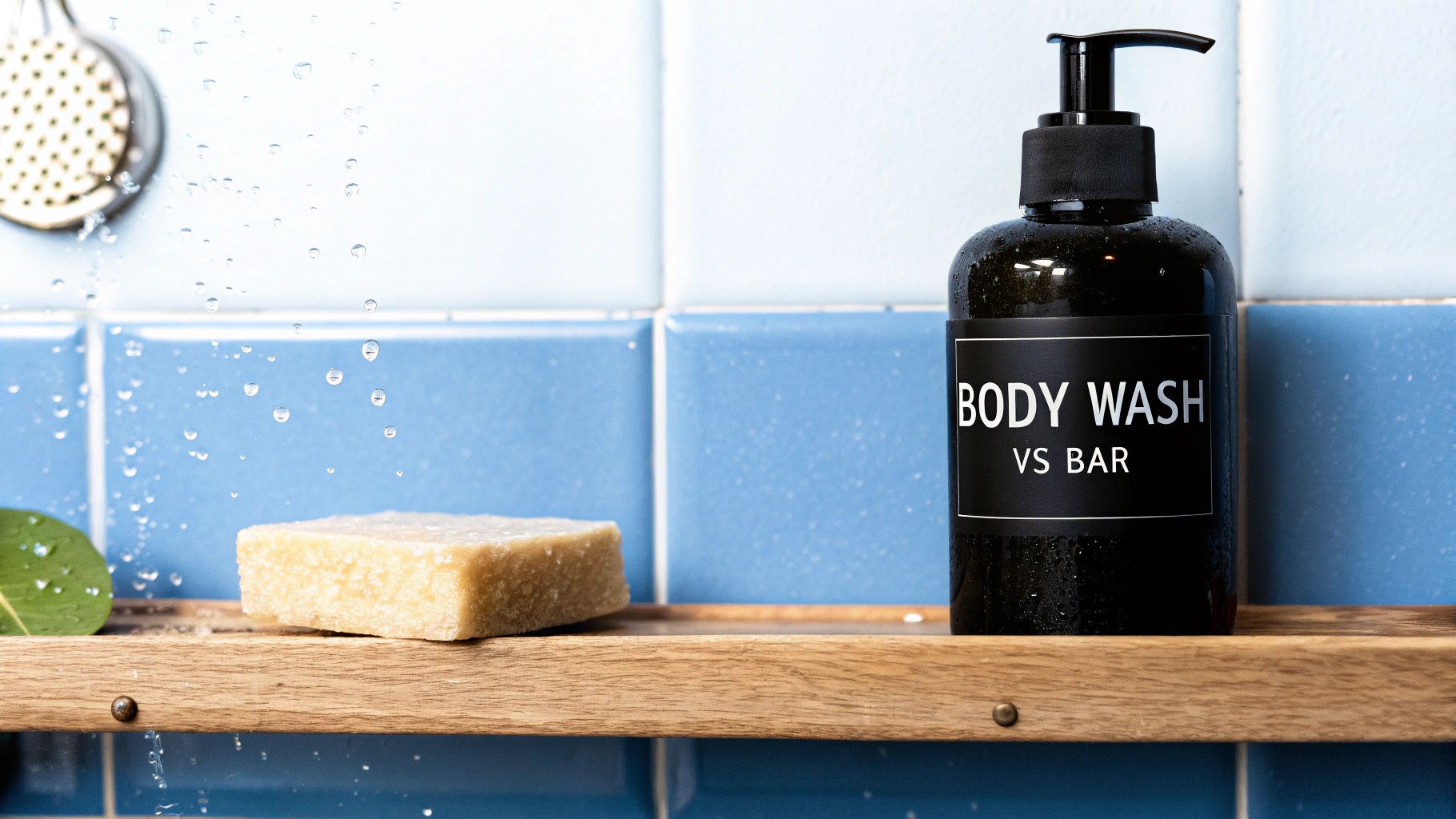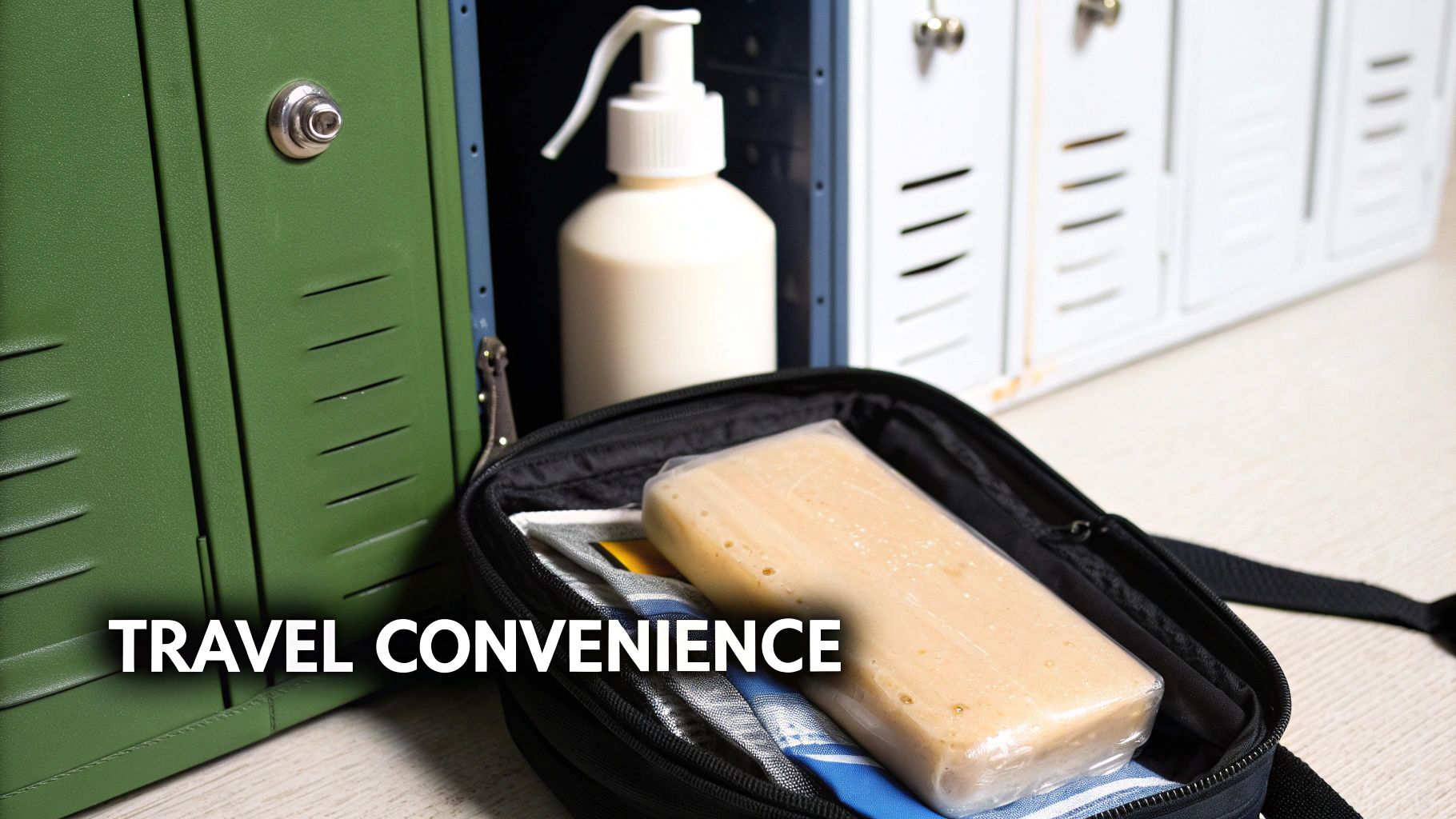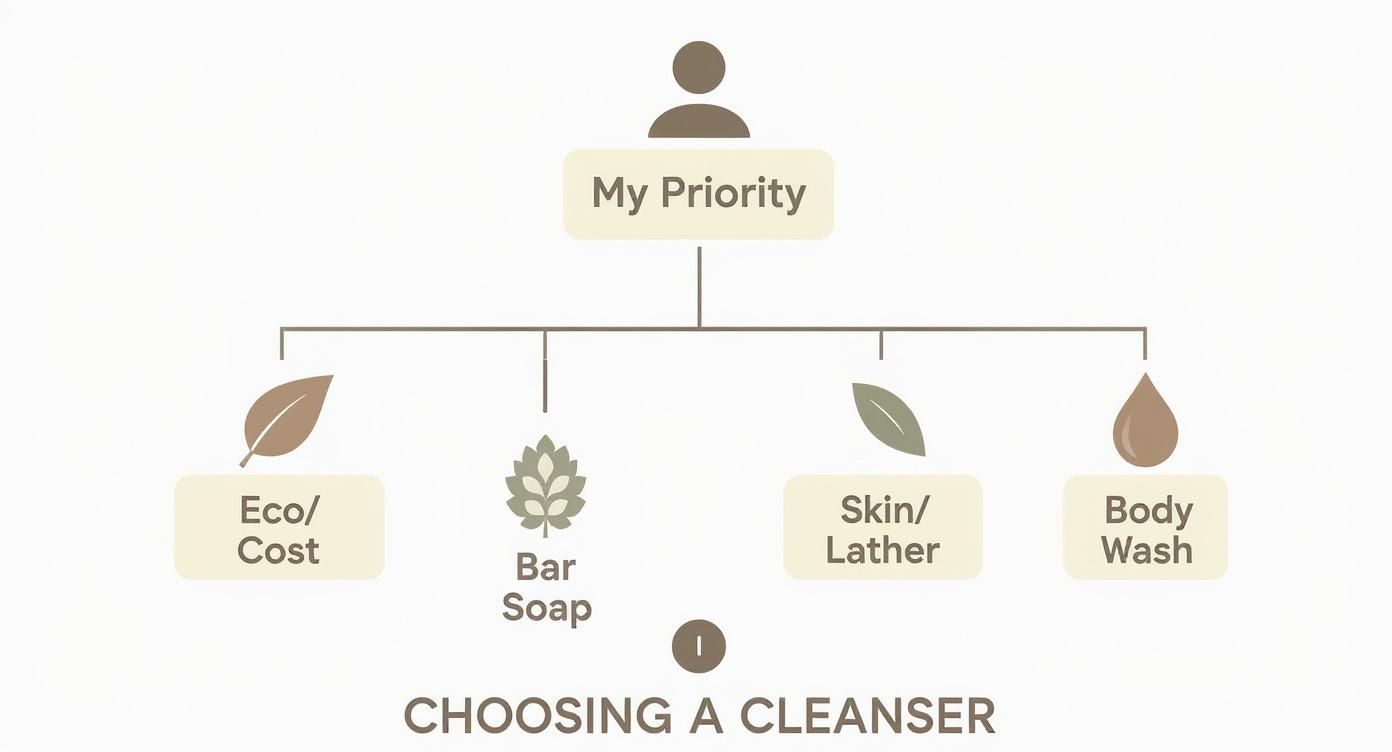Jan Elvis
27.11.2025

Jan Elvis
27.11.2025
The whole body wash vs bar soap debate really boils down to this: body washes are engineered for hydration and specialized skincare in a convenient liquid, while traditional bar soaps give you a powerful, no-nonsense clean in a solid, low-waste form. The best one for you is all about what you value more—targeted skin benefits or minimalist efficiency.

When you get right down to it, the choice between these two shower staples is about much more than just solid versus liquid. It’s a game of formulation, how it feels to use, and what it does for your specific skin type. Think of body wash as a liquid cleanser, built with surfactants that whip up a rich lather and are often packed with moisturizers like glycerin or shea butter.
This formulation makes body washes fantastic for tackling specific issues like dryness, irritation, or sensitive skin. You've probably also seen shower gels on the shelf; they're similar, but not identical. We break down the finer points in our guide on the difference between shower gel and body wash if you want to get granular.
Bar soap, on the other hand, is born from a classic process called saponification, where fats and oils are mixed with an alkali. The result is a solid, highly concentrated cleanser. And while old-school bar soaps had a reputation for being harsh and drying, today’s versions are a whole different story, often loaded with nourishing oils and butters to clean your skin without stripping it bare.
Key Takeaway: Body wash brings a convenient, often hydrating experience with specialized formulas. Bar soap delivers a concentrated, eco-friendly clean that has seriously evolved from its basic origins.
This isn't just a shower debate; it's a massive industry. The global bath and shower products market was valued at USD 52.10 billion and is still growing, with body wash currently dominating the market share. This trend shows how much guys now value that luxurious feel and the wide variety of scents you get with liquid cleansers.
At the end of the day, one isn't flat-out "better" than the other. It’s all about what works for you and your routine.
For a quick summary, here’s how the two stack up on the most important points. This table cuts through the noise and gives you a clear side-by-side look.
| Attribute | Body Wash | Bar Soap |
|---|---|---|
| Formulation | Liquid cleanser with surfactants & moisturizers | Saponified oils and fats, solid and concentrated |
| Skin Feel | Typically creamy, hydrating, and smooth | Varies from "squeaky clean" to soft and nourished |
| Hygiene | Self-contained, great for sharing (like at the gym) | Needs a draining dish to stay dry and bacteria-free |
| Packaging | Usually plastic bottles | Minimal, often just paper or cardboard |
This at-a-glance view helps frame the decision, but the best choice always comes down to personal preference and your skin's unique needs.
When you get down to it, the whole body wash versus bar soap debate really comes down to what's inside the bottle or wrapper. It's less about the lather and more about the ingredient list. The chemistry behind each one is fundamentally different, and that’s where you'll notice the biggest difference in how your skin feels.
Body washes are basically liquid detergents. They get that rich, satisfying foam from ingredients called surfactants—think sodium lauryl sulfate (SLS). These are great for cutting through grime, but they can be a bit too good at their job. Sometimes, they strip away the natural oils your skin needs to stay protected, leaving it feeling dry and irritated.
To get around this, you'll see a lot of modern body washes packed with hydrating ingredients to put moisture back in. The ingredient list often reads like a who's who of skincare heroes:
This kind of formulation makes body wash a solid choice for guys with dry, sensitive, or easily-irritated skin, since it cleanses and moisturizes at the same time.
On the other hand, traditional bar soaps are made through a process called saponification. It's a simple, age-old chemical reaction where fats and oils are mixed with an alkali, like lye. Don't worry—in a properly made bar, all the lye is converted, leaving you with pure soap and glycerin, which is a great natural moisturizer.
The real kicker with bar soap, though, is its pH level. A classic bar of soap is alkaline, usually with a pH somewhere between 9 and 10. Your skin, however, is naturally a bit acidic, sitting around a pH of 5.5. That mismatch is what causes that "squeaky clean" feeling some bar soaps leave behind, which is often a sign that your skin's moisture barrier has been stripped.
That’s where modern 'syndet' bars come in. These aren't technically soap. They’re synthetic detergent bars formulated with a pH much closer to your skin's natural level, giving you a gentler clean without the harsh, drying effect.
Beyond just cleaning, the chemical makeup of a product, especially its pH, plays a huge role in how it interacts with your skin. For a deeper dive into the importance of pH-balanced cleansers and why they matter for sensitive surfaces, insights from cleaning experts offer great context. The same logic applies directly to skincare—a product’s pH is a critical piece of the puzzle for keeping your skin barrier healthy.
So, while a body wash might come loaded with extra hydrators, a well-formulated, pH-balanced bar soap can be just as gentle. And for guys with oily or acne-prone skin, some bar soaps are fantastic. Ones with ingredients like charcoal or tea tree oil can help absorb excess oil and offer antibacterial benefits, often without the heavy moisturizers found in many body washes. At the end of the day, it's about knowing your skin and reading the label—not just grabbing the first thing you see on the shelf.

Forget the chemistry for a second. The real decider in the body wash vs bar soap debate often comes down to how it feels to actually use the stuff. This choice dictates the whole vibe of your shower, from the moment you step in to how your skin feels hours later. It’s less about just getting clean and more about the ritual.
Body washes are made for a full-on sensory experience. To get the most out of them, you’ll want a loofah or washcloth. Squeeze a small amount on, and it explodes into a thick, satisfying foam that makes you feel like you're getting a deep, all-over clean. Plus, using a loofah gives you a bit of gentle exfoliation, which helps slough off dead skin.
Bar soap, on the other hand, is all about that direct, no-fuss approach. It’s just you and the bar—no extra tools needed. The lather can be all over the place depending on the formula; some bars give you a dense, creamy foam while others are lighter and bubblier. It's efficient, straightforward, and gets the job done.
The lather and scent are where personal preference really kicks in. Body wash often brings a modern, almost spa-like feel to your shower, whereas bar soap delivers a more classic, grounded clean.
This one's all you. If your shower is a daily escape where you want an amazing scent and tons of foam, body wash is your go-to. If you're after a minimalist, get-in-and-get-out clean with a timeless, subtle smell, a good bar soap is hard to beat.
At the end of the day, it's about what you want out of those five or ten minutes under the water.
How your skin feels after you’ve dried off is the final piece of the puzzle. A quality body wash, especially one with moisturizing ingredients, can leave your skin feeling soft, often cutting down on that tight, dry feeling.
Bar soaps, especially the old-school ones, are famous for that "squeaky clean" finish some guys really like. That said, plenty of modern, well-crafted bars are formulated to leave your skin feeling soft and nourished, not stripped.
No matter which one you pick, locking in moisture afterward is a non-negotiable. Knowing when to apply lotion after a shower is what separates a basic routine from a great one. This simple step keeps your skin hydrated and healthy all day long, turning a simple wash into genuine skincare.

Sometimes, the debate isn't about what happens in the shower—it’s about everything else. Practical stuff like hygiene, travel, and pure convenience often decides which product earns a permanent spot in your routine.
Let’s tackle the biggest myth first: the "dirty" bar of soap. It's a common hang-up, especially for younger guys. In fact, a whopping 48% of men aged 18-24 are convinced bar soaps are crawling with germs after you use them. This perception, combined with data showing 55% of people find bars less convenient, has definitely pushed liquid soaps into the spotlight, according to recent bar soap market research.
But here’s the reality: the idea of a germ-infested bar of soap is mostly overblown. While some bacteria might hang out on a wet bar, studies have shown it doesn't really transfer to your skin when you wash. The secret is all in the storage.
Pro Tip: Let it breathe. A draining soap dish is your bar's best friend. Letting it dry out completely between uses stops it from turning into a soft, mushy mess and makes it last way longer.
Your environment makes a huge difference. If you're showering in a shared space like a dorm or the gym, body wash is the clear winner. The pump or squeeze bottle keeps the actual product contained and untouched by anyone else, which is a major plus when you can't vouch for the cleanliness of the space.
This is exactly the kind of situation where a product like Main Character body wash is clutch. It’s built for the guy on the move, offering a no-fuss, hygienic option that you can just throw in your gym bag and go.
When it’s time to pack a bag, however, the tables turn dramatically. Bar soap becomes the MVP of travel. We’ve all been there—opening a suitcase to find a gooey, soapy mess because a bottle of body wash exploded everywhere. Bar soap completely eliminates that nightmare.
Its solid form is 100% spill-proof and breezes right through TSA checks in your carry-on. Just pop it in a simple travel case, and you’re set. While you can find travel-sized body washes, a solid bar is just simpler and more dependable for a life on the go. For anyone who travels often, this is a massive win for bar soap.
When you're staring at the shower aisle, the price tag is usually the first thing that catches your eye. But the real story in the body wash vs. bar soap debate runs much deeper than what you pay upfront, touching on both long-term value and your environmental impact.
That bottle of body wash might seem like the cheaper option, but it's often a bit of a financial trick. Since body washes are mostly water, you naturally use more product to get the job done. A solid, concentrated bar of soap, on the other hand, contains very little water and lasts way longer, often outliving a bottle of body wash by weeks. For anyone watching their spending, bar soap is the hands-down winner on a cost-per-use basis.
Your choice in the shower has a ripple effect on the planet, too. Body wash almost always comes in plastic bottles, which adds to the mountain of plastic waste we generate every year. Even though many bottles are recyclable, the hard truth is that a massive number of them still wind up in landfills.
Bar soap, in contrast, is the more minimalist choice. It’s usually wrapped in simple paper or a cardboard box—both easily recyclable. Making this one small switch is a surprisingly effective way to cut down on your plastic consumption and build a grooming routine with a smaller footprint.
Key Insight: The environmental cost of body wash goes beyond just the plastic bottle. Because it's heavier (thanks to all that water), it takes more energy and fuel to ship from the factory to the store, giving it a bigger carbon footprint than a lightweight, compact bar of soap.
If saving money and cutting down on waste are your top priorities, this decision tree makes the choice pretty clear.

The flowchart really simplifies things: if you’re leading with your wallet and a desire to be more eco-friendly, bar soap is the obvious path.
Let's break down the total impact in a head-to-head comparison.
| Factor | Body Wash | Bar Soap |
|---|---|---|
| Packaging | Primarily plastic bottles, contributing to plastic pollution. | Minimal paper or cardboard, often recyclable and biodegradable. |
| Cost-Per-Use | Higher. You pay for a lot of water and tend to use more product per wash. | Lower. The concentrated bar lasts significantly longer. |
| Shipping Footprint | Heavier and bulkier, requiring more fuel for transportation. | Lightweight and compact, resulting in a lower carbon footprint. |
| Water Content | High (up to 90%), which dilutes the active ingredients. | Low. It's a solid, concentrated cleanser offering more value. |
Ultimately, the numbers don't lie. While body wash might win on convenience for some, bar soap takes the crown for being both budget-friendly and better for the environment.
Choosing products with less environmental baggage is a huge part of living more sustainably. To get a bigger picture, you can learn more about how to reduce your environmental footprint in all aspects of your life. It’s all about making smarter, smaller choices that add up to a big win for your bank account and the planet.
When it comes to the body wash vs bar soap debate, there’s no single right answer. It’s less about picking a permanent winner and more about building a smart grooming toolkit that adapts to your life. The best choice depends on the job at hand—your skin, your schedule, and what you need from your shower that day.
For a lot of guys, a classic bar of soap just makes sense. It’s straightforward, effective, and gets the job done without any fuss.
But body wash has its own lane, and it really shines when you need something more than just a basic clean.
Body wash is all about delivering specialized formulas and a more sensory experience that most bars just can't replicate. It’s time to grab the body wash when:
The Hybrid Approach: The smartest move? Don't choose. Use both. Keep a go-to bar soap for your quick, daily rinse-offs. Then, have a great body wash on standby for when you need more—like a minty, energizing wash to wake you up or a recovery formula for after a brutal workout.
This strategy gives you the best of both worlds. For those times you need that powerful, targeted clean designed for an active lifestyle, finding the best body wash for men is a total game-changer. It’s all about knowing what you need and when you need it. That’s how you take control of your grooming routine.
Got a few lingering questions about the whole body wash vs. bar soap debate? Let's clear things up with some straightforward answers to what guys usually ask.
That’s a classic myth, but the science doesn't back it up. While it’s true that some bacteria can hang out on a wet bar, studies have shown it's incredibly unlikely to transfer to your skin in any significant way when you wash. Just give the bar a quick rinse before and after you use it, and you're good to go.
The real secret is storing it right. Get a soap dish with good drainage. This lets the bar dry out completely between showers, keeping it hard and preventing that slimy, bacteria-friendly mess. A dry bar is a clean bar.
I'd strongly advise against it. The skin on your face is way more sensitive and delicate than the skin on, say, your back or arms. Body washes are built for tougher skin and often pack in fragrances and powerful cleansing agents that can easily lead to irritation, dryness, or even breakouts on your face. Stick with a cleanser made specifically for your face.
Nine times out of ten, a solid, high-quality bar of soap will outlive a bottle of body wash. Think about it: bar soaps are super-concentrated solids with almost no water, so a little goes a long way. This staying power usually makes bar soap the more budget-friendly choice over time, meaning you get more bang for your buck.
Ready to upgrade your shower routine with a cleanser that actually keeps up with you? Main Character is built for guys who take their grooming seriously.
Check out our energizing body wash and take control of your shower.